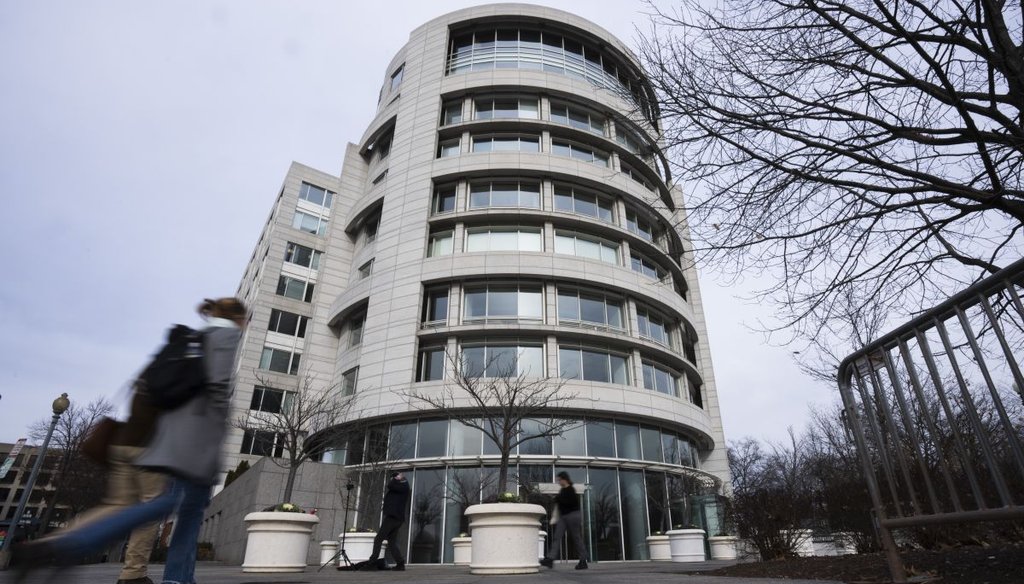Stand up for the facts!
Our only agenda is to publish the truth so you can be an informed participant in democracy.
We need your help.
I would like to contribute

The building that has housed the Penn Biden Center in Washington, D.C., on Jan. 10, 2023. (AP)
As former President Donald Trump prepared to be arraigned on charges related to his handling of classified documents, some supporters complained that Trump has been indicted by a special counsel while President Joe Biden hasn’t.
Information about Biden’s documents broke Jan. 9 when CBS News reported that Biden’s lawyers had discovered documents, some with classification markings, in a locked closet two months earlier. The lawyers said they found the documents as they cleaned out Biden’s post-vice presidential office at the Penn Biden Center for Diplomacy and Global Engagement in Washington, D.C.
On the eve of Trump’s arraignment, Sen. Ted Cruz, R-Texas, tweeted, "Joe Biden did the exact same thing, and the DOJ doesn't care!"
The two situations are similar in some ways — but only up to a point, experts told PolitiFact.
The Justice Department appointed a special counsel to investigate Biden’s handling of classified documents, just as the department did for Trump. The investigation of Biden is under way, with only small bits of anonymously sourced information becoming public. The department has not released formal information about its process, as is typical for ongoing investigations.
By contrast, the FBI’s Trump investigation started earlier, in March 2022, with a grand jury summoned the following month, and reached the indictment phase June 8.
Bradley Moss, a Washington, D.C., lawyer who works on national security cases, told PolitiFact that "threshold similarities" exist between the cases.
"Both Mr. Trump and President Biden had documents with classification markings stored in unauthorized locations while they were private citizens," Moss said. "That is impermissible and a violation of federal law."
Beyond that, the Trump case sets a high bar for seriousness and has a number of extraordinary circumstances that the Biden case so far lacks — particularly a failure to return the documents once they were discovered.
Here are factors in Trump’s case to keep in mind as we hear comparisons to the ongoing Biden investigation.
• "Willful retention" of documents. Trump is charged with 31 counts of "willful retention of national defense information." Under this provision, someone who "willfully retains" a covered document "and "fails to deliver it to the officer or employee of the United States entitled to receive it" can be fined or imprisoned if found guilty.
Willful retention "implies a knowing retention in derogation of a duty to return it," said James Robenalt, a partner with the law firm Thompson Hine LLP who studies abuse-of-power cases.
A prior example of a senior government official mishandling classified documents involved Hillary Clinton, the former secretary of state who was investigated while running for president in 2016. When then-FBI Director James Comey declined to prosecute Clinton for sending classified information on her private email server, he cited her intent, saying the investigation "did not find clear evidence that Secretary Clinton or her colleagues intended to violate laws governing the handling of classified information."
The Justice Department "simply does not bother to prosecute pure inadvertent mishandling," Moss said.
"When they have pursued prosecution, there was evidence of intent and/or obstruction. At the moment, there is no evidence of President Biden having that requisite intent or having engaged in obstruction. That, of course, is what the special counsel on that matter is investigating, and those facts could always change."
• A lack of cooperation with the authorities. Beyond the charges of "willful retention," Trump is also charged with a conspiracy to obstruct justice by hiding and concealing documents, withholding a document from a grand jury, corruptly concealing a document or record from a grand jury; and concealing a document in a federal investigation.
Among other things, the indictment alleges that Trump suggested that his attorney make false declarations to the FBI and grand jury and directed an employee, Walt Nauta, to conceal boxes by moving them.
So far, there has been no public indication that Biden has failed to cooperate with law enforcement.
Biden’s team said the attorneys promptly notified the National Archives, which took the materials Nov. 3.
"The White House is cooperating with the National Archives and the Department of Justice regarding the discovery of what appear to be Obama-Biden Administration records, including a small number of documents with classified markings," Richard Sauber, special counsel to Biden, said in a statement in January.
On Jan. 11, news broke that a second set of classified documents had been discovered in Biden’s Wilmington, Delaware, house, in a garage and a nearby room. The number of documents was not specified.
Sauber said, "We have cooperated closely with the Justice Department throughout its review, and we will continue that cooperation with the special counsel. We are confident that a thorough review will show that these documents were inadvertently misplaced, and the president and his lawyers acted promptly upon discovery of this mistake."
An additional trove of documents, covering Biden’s years in the Senate, was donated to the University of Delaware. CNN reported that the FBI has conducted two searches of these papers, which were carried out with the consent and cooperation of the president's legal team.
• Quantity of documents. In Trump’s case, 38 documents with classified markings were recovered due to a grand jury subpoena, and an additional 102 documents with classified markings were discovered during the search of Mar-a-Lago.
Little is known about the documents at issue in the Biden case. Sauber’s statement used the term "small" to describe the number of classified documents at issue, and news reports have characterized it as about a dozen. But law enforcement officials have not offered details.
• Seriousness of the documents. Even by the standards of classified documents, some of those at issue in the Trump case included some of the highest levels of classification.
SCI, or "sensitive compartmented information," is supposed to be used within a special secure facility called a SCIF. Another classification, NOFORN, cannot be revealed to foreign nationals, while those with another label, FVEY, can only be shared with other members of the "five eyes" intelligence group that includes the U.S., Australia, Canada, New Zealand and the United Kingdom. Another classification known as SAP, or "special access programs," are particularly sensitive and require specialized permissions to view.
Nothing is known yet about the levels of classification at issue with Biden’s documents.
• Sharing of documents. In at least two cases, the indictment alleges that Trump shared documents with individuals who did not have the requisite security clearance to view them.
Both meetings occurred at Trump’s golf club in Bedminster, New Jersey, in the summer of 2021. In one case, the indictment says, Trump "showed and described a plan of attack" to a writer, publisher and two staff members. In the other instance, Trump showed a representative of his political action committee "a classified map related to a military operation," the indictment says.
There is no indication yet that Biden improperly shared any of the documents with people who did not have security clearance.
• Direct involvement. The special counsel’s indictment details Trump’s close supervision of the document-concealing process and how he involved Nauta and other Mar-a-Lago employees as well as his attorneys.
In one case, the indictment cites a Trump attorney saying Trump had told him to take classified documents he found at Mar-a-Lago to his hotel room, then made a "plucking motion," which the attorney understood to mean that "if there’s anything really bad in there, like, you know, pluck it out," according to the attorney’s contemporaneous notes as cited in the indictment.
The extent of Biden’s personal involvement with the classified documents is not yet known.
The indictment does not discuss why Trump may have acted as he did. Legal experts emphasize that securing a conviction on these charges does not require the prosecution to offer the jury a motive.
"We do care whether Trump or Biden knew they had these documents, but that is intent, not motive," said Ric Simmons, an Ohio State University law professor. "Motive is why the people did what they did, and that doesn't matter legally."
Staff Writer Maria Ramirez Uribe contributed to this article.
Our Sources
PolitiFact, "Why Espionage Act charges don't mean prosecutors are accusing Donald Trump of spying," June 12, 2023
PolitiFact, "The Trump documents indictment: Which charges are most serious? Can he still run in 2024?" June 9, 2023
PolitiFact, "Trump, Biden classified documents cases differ in key ways. Here’s how," Jan. 10, 2023
PolitiFact, "9 Trump claims about the Mar-a-Lago classified documents probe, fact-checked," June 7, 2023
Indictment of Donald Trump on the documents case
Ted Cruz, tweet, June 12, 2023
Washington Post, "Why Trump was charged on secret documents and Clinton, Pence were not," June 11, 2023
ABC News, "No, Donald Trump's classified documents case is not like Joe Biden or Hillary Clinton cases," June 13, 2023
The Independent, "Biden and Pence were also caught with classified documents. Why is Trump’s case different?" June 13, 2023
Email interview with James D. Robenalt, partner at the law firm Thompson Hine LLP, June 13, 2023
Email interview with Joan Meyer, former prosecutor and partner at the law firm Thompson Hine LLP, June 13, 2023
Email interview with Ric Simmons, Ohio State University law professor, June 13, 2023
Email interview with Bradley Moss, Washington, D.C., attorney who specializes in national security matters, June 13, 2023
Other sources linked in article












































